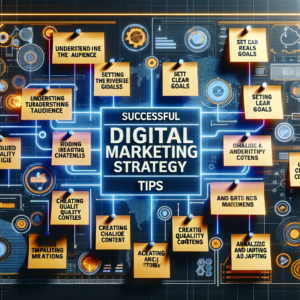Introduction: Navigating the Digital Marketing Strategy Landscape
In today’s digital age, crafting an effective digital marketing strategy is crucial for businesses of all sizes and industries. This blog post explores the multifaceted world of digital marketing strategies, providing insights and practical examples. Whether you’re a small business owner, a B2B marketer, or just keen on understanding digital marketing, this guide will offer valuable perspectives to enhance your online marketing efforts.
What Are Digital Marketing Strategies?

Digital marketing strategies encompass the plans and actions designed to achieve marketing goals through online channels. These strategies are comprehensive frameworks that guide the how, where, and when of digital marketing efforts. They encompass various components, such as:
- SEO: Enhancing online visibility in search engine results.
- Content Marketing: Creating and distributing valuable content.
- Social Media Marketing: Engaging with audiences on social platforms.
- Email Marketing: Communicating with customers through emails.
- PPC Advertising: Paid ads that cost per click.
- Affiliate Marketing: Partnering with others to promote products.
Each element plays a critical role in forming a cohesive digital marketing strategy that aligns with a business’s goals, target audience, and resources.
Digital Marketing Strategy Examples

Let’s explore some real-life examples of digital marketing strategies:
- SEO for E-Commerce: An online retailer focusing on SEO to improve product visibility on search engines.
- Content Marketing for Tech Companies: A tech company creating in-depth guides and articles to establish thought leadership.
- Social Media Campaigns for Retail Brands: A clothing brand using Instagram stories and influencer collaborations to boost engagement.
- Email Marketing for Service Providers: A consulting firm using personalized email campaigns for lead nurturing.
- PPC Campaigns for Startups: A new app using targeted Google Ads to drive app downloads.
These examples illustrate how various strategies can be tailored to specific business needs and goals.
Digital Marketing for Small Businesses

Small businesses can leverage digital marketing strategies effectively by focusing on cost-effective and high-impact tactics. Key strategies include:
- Local SEO to target nearby customers.
- Social media marketing to build community and brand loyalty.
- Email marketing for direct communication and promotions.
- Content marketing to provide value and build trust.
For small businesses, the key is to start small, measure results, and gradually expand efforts.
Successful Digital Marketing Strategy Tips

To create a successful digital marketing strategy, consider these tips:
- Understand Your Audience: Tailor your strategy to your audience’s preferences and behaviors.
- Set Clear Goals: Define what success looks like for your business.
- Choose the Right Channels: Not all platforms are suitable for every business.
- Create Quality Content: Content is king in digital marketing.
- Analyze and Adapt: Regularly review your strategy’s performance and make necessary adjustments.
These tips can help businesses of all sizes to develop and refine their digital marketing strategies.
B2B Digital Marketing Strategy

B2B digital marketing strategies differ from B2C in several ways. Key strategies include:
- LinkedIn marketing for professional networking and lead generation.
- In-depth content marketing like whitepapers and case studies.
- Email marketing with a focus on nurturing long-term relationships.
- Webinars and virtual events for thought leadership.
For B2B companies, the focus is often on building relationships and demonstrating expertise.
Conclusion: Crafting Your Digital Marketing Strategy
In conclusion, a digital marketing strategy is a vital component of a business’s overall marketing plan. From small businesses to large corporations, B2C to B2B, the right digital marketing strategy can significantly impact brand visibility, customer engagement, and ultimately, business growth. The key is to understand your audience, set clear goals, choose the right channels, and consistently produce quality content. By doing so, and by continually analyzing and adapting your strategy, you can create a strong online presence that resonates with your target audience and drives success in the digital world.




